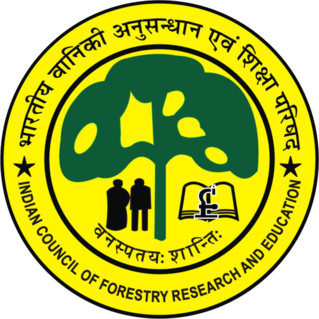
University Grants Commission (UGC) is a statutory body set up by the Department of Higher Education, Ministry of Education, Government of India in accordance to the UGC Act 1956 and is charged with coordination, determination and maintenance of standards of higher education in India. It provides recognition to universities in India, and disbursements of funds to such recognized universities and colleges. The headquarters are in New Delhi, and it has six regional centres in Pune, Bhopal, Kolkata, Hyderabad, Guwahati and Bangalore. A proposal to replace it with another new regulatory body called HECI is under consideration by the Government of India. The UGC provides doctoral scholarships to all those who clear JRF in the National Eligibility Test. On an average, each year ₹725 crore (US$91 million) is spent on doctoral and post-doctoral fellowships by the commission.

The All India Council for Technical Education (AICTE) is a statutory body, and a national-level council for technical education, under the Department of Higher Education. Established in November 1945 first as an advisory body and later on in 1987 given statutory status by an Act of Parliament, AICTE is responsible for proper planning and coordinated development of the technical education and management education system in India.

The National Council of Educational Research and Training (NCERT) is an autonomous organisation of the Government of India which was established in 1961 as a literary, scientific and charitable Society under the Societies Registration Act. Its headquarters are located at Sri Aurbindo Marg in New Delhi. Roshan is Director of the council since 2022.

The Department of Education is the executive department of the Philippine government responsible for ensuring access to, promoting equity in, and improving the quality of basic education. It is the main agency tasked to manage and govern the Philippine system of basic education. It is the chief formulator of Philippine education policy and responsible for the Philippine primary and secondary school systems. It has its headquarters at the DepEd Complex in Meralco Avenue, Pasig.

The Indian Council of Forestry Research and Education (ICFRE) is an autonomous organisation or governmental agency under the Ministry of Environment and Forests, Government of India. Headquartered in Dehradun, its functions are to conduct forestry research; transfer the technologies developed to the states of India and other user agencies; and to impart forestry education. The council has 9 research institutes and 4 advanced centres to cater to the research needs of different bio-geographical regions. These are located at Dehradun, Shimla, Ranchi, Jorhat, Jabalpur, Jodhpur, Bengaluru, Coimbatore, Prayagraj, Chhindwara, Aizawl, Hyderabad and Agartala.
Department of Higher Education is the department under Ministry of Education, that oversees higher education in India.
The Board of Theological Education of the Senate of Serampore College (BTESSC) is the arm of theological education under the Senate of Serampore College (University). BTESSC was formed in 1975.

Indian Nursing Council is a national regulatory body for nurses and nurse education in India. It is an autonomous body under the Government of India, Ministry of Health & Family Welfare, constituted by the Central Government under section 3(1) of the Indian Nursing Council Act, 1947 of Indian parliament. According to the original act the function of the council is to provide "uniformity in nursing education".
Institute of National Importance (INI) is a status that may be conferred on a premier public higher education institution in India by an act of Parliament of India, an institution which "serves as a pivotal player in developing highly skilled personnel within the specified region of the country/state". Institutes of National Importance receive special recognition, higher autonomy and funding from the Government of India.

Lovely Professional University (LPU) is a private university located in Chaheru, Phagwara, Punjab, India. The university was established in 2005 by Lovely International Trust, under The Lovely Professional University Act, 2005 and started operation in 2006.

Chitkara University is a private university located in Rajpura, Punjab, India. It offers undergraduate programs, post-graduate program and doctoral programs in fields of engineering, management, pharmacy, health sciences, nursing, hospitality, art & design and education. It was established and is managed by the Chitkara Educational Trust.

National Council for Teacher Education (NCTE) is a statutory body of Indian government set-up under the National Council for Teacher Education Act, 1993 in 1995 is to formally oversee standards, procedures and processes in the Indian education system. This council functions for the central as well as state governments on all matter with regard to the Teacher Education and its secretariat is located in the Department of Teacher Education and National Council of Educational Research and Training (NCERT). Despite the successful functioning in terms of educational field, it is facing difficulties in ensuring the maintenance of the standards of teacher education and preventing the increase in the number of substandard teacher education institutions in the country.
National Curriculum Framework for Teacher Education 2009 is a Government of India draft created for proposing changes and updates required to the National Council for Teacher Education, an Indian government body set up under the National Council for Teacher Education Act, 1993 in 1995.

The Ministry of Education is a ministry of the Government of India, responsible for the implementation of the National Policy on Education. The ministry is further divided into two departments: the Department of School Education and Literacy, which deals with primary, secondary and higher secondary education, adult education and literacy, and the Department of Higher Education, which deals with university level education, technical education, scholarships, etc.
Jaipur National University (JNU), established on 22 October 2007, is a private university located in Jaipur, the capital of Rajasthan, India. Founded through an ordinance passed by the Government of Rajasthan.

Chandigarh University (CU) is a private university located in Mohali, Punjab, India.The university was established on 10 July 2012 by an act of Punjab Legislative Assembly, the state legislature. It is recognized by University Grants Commission under Section 2(f) with the right to confer degrees as per Section 22(1) of the UGC Act, 1956. Chandigarh University has been accredited 'A+' by NAAC in 2019.

K. Gopal is an Indian doctor and politician. He obtained a M.B.B.S degree from Thanjavur Medical College. He is married to Sangamithra, Daughter of late Indian National Congress veteran MLA V.Vedaiyan. Gopal was a Member of the Legislative Assembly from Nannilam 1991 to 1996. In 2014 he was elected to the Lok Sabha from the Nagapattinam as an Anna Dravida Munnetra Kazhagam candidate in the 2014 election. He won the seat with 46.06% and was elected Member of Parliament for Nagapattinam for 16th Lok Sabha.
The Quality Council of India (QCI) was set up as a public private partnership model on the model existing in Netherlands at the time, where although the NAB was not owned by the government, yet it was supported by it and was exceedingly used as a third party agency to improve quality in departments and industry. QCI thus, came to be organized as an independent autonomous body that worked towards assuring quality standards across all spheres of economic and social activities. Key industry associations, i.e. Associated Chambers of Commerce and Industry of India (ASSOCHAM), Confederation of Indian Industry(CII) and Federation of Indian Chambers of Commerce and Industry (FICCI) became the promoters of the organizers and QCI got established under the Societies Registration Act in 1996 to provide accreditation services in various sectors for product, services and persons.

National Medical Commission (NMC) is an Indian regulatory body of 33 members which regulates medical education and medical professionals. It replaced the Medical Council of India on 25 September 2020. The Commission grants recognition of medical qualifications, gives accreditation to medical schools, grants registration to medical practitioners, and monitors medical practice and assesses the medical infrastructure in India.












